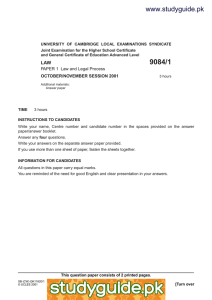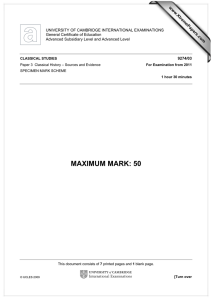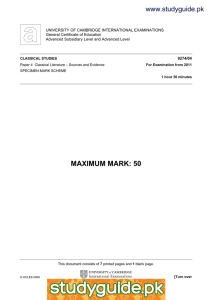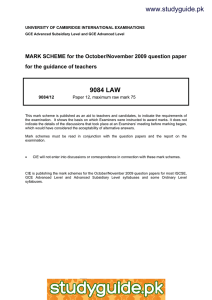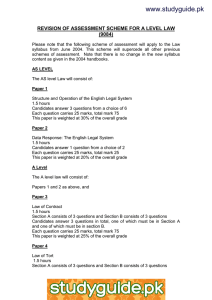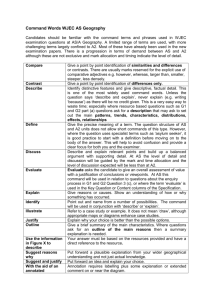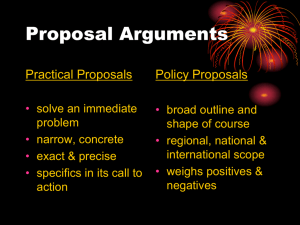www.studyguide.pk
advertisement
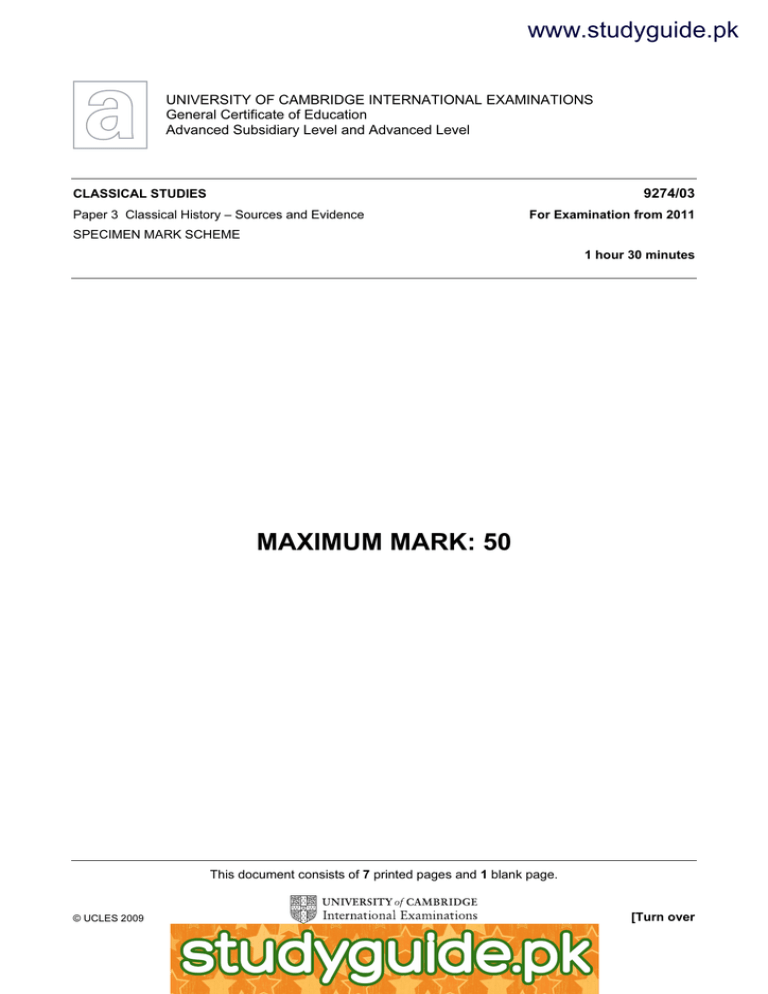
www.studyguide.pk UNIVERSITY OF CAMBRIDGE INTERNATIONAL EXAMINATIONS General Certificate of Education Advanced Subsidiary Level and Advanced Level CLASSICAL STUDIES 9274/03 Paper 3 Classical History – Sources and Evidence For Examination from 2011 SPECIMEN MARK SCHEME 1 hour 30 minutes MAXIMUM MARK: 50 This document consists of 7 printed pages and 1 blank page. [Turn over © UCLES 2009 www.xtremepapers.net www.studyguide.pk 2 9274/03 Generic marking descriptors (A level) • • • • The full range of marks will be used as a matter of course. Examiners will look for the ‘best fit’, not a ‘perfect fit’ in applying the Levels. Good performance on one AO may compensate for shortcomings on others. HOWEVER, essays not deploying material over the full range of the two AOs will be most unlikely to attain a mark in Level 5. Examiners will provisionally award the middle mark in the Level and then moderate up/down according to individual qualities within the answer. Question-specific mark schemes will be neither exhaustive nor prescriptive. Appropriate, substantiated responses will always be rewarded. Answers may develop a novel and possibly intuitive response to a question. This is to be credited if arguments are fully substantiated. Level/marks 5 50–40 marks 4 39–30 marks 3 29–20 marks 2 19–10 marks © UCLES 2009 Descriptors ANSWERS MAY NOT BE PERFECT, BUT WILL REPRESENT THE VERY BEST THAT MAY BE EXPECTED AT THIS LEVEL. • Strongly focussed analysis that answers the question convincingly. • Sustained argument with a strong sense of direction. Strong, substantiated conclusions. • Gives full expression to material relevant to all three AOs. • Towards the bottom, may be a little prosaic or unbalanced in coverage yet the answer is still comprehensively argued. • Wide range of citation of relevant information, handled with confidence to support analysis and argument. • Excellent exploration of the wider context, if relevant. ANSWERS WILL SHOW MANY FEATURES OF LEVEL 5, BUT THE QUALITY WILL BE UNEVEN ACROSS THE ANSWER. • A determined response to the question with clear analysis across most but not all of the answer. • Argument developed to a logical conclusion, but parts lack rigour. Strong conclusions adequately substantiated. • Response covers all AOs, but is especially strong on one AO so reaches this Level by virtue of the argument / analysis. • Good but limited & / or uneven range of relevant information used to support analysis and argument. Description is avoided. • Good analysis of the wider context, if relevant. THE ARGUMENT WILL BE REASONABLY COMPETENT, BUT LEVEL 3 ANSWERS WILL BE LIMITED & / OR UNBALANCED. • Engages well with the question although analysis is patchy and, at the lower end, of limited quality. • Tries to argue and draw conclusions, but this breaks down in significant sections of description. • The requirements of all three AOs are addressed, but without any real display of flair or thinking. • Good but limited &/or uneven range of relevant information used to describe rather than support analysis and argument. Fair display of knowledge to describe the wider context, if relevant. ANSWERS WILL SHOW A GENERAL MISMATCH BETWEEN QUESTION & ANSWER. • Some engagement with the question, but limited understanding of the issues. Analysis is limited / thin. 9274/03/SM/11 www.xtremepapers.net www.studyguide.pk 3 • • • • 1 9–0 marks © UCLES 2009 Limited argument within an essentially descriptive response. Conclusions are limited / thin. Factually limited &/or uneven. Some irrelevance. Perhaps stronger on AO1 than AO2 (which might be addressed superficially or ignored altogether). Patchy display of knowledge to describe the wider context, if relevant. ANSWERS IN LEVEL 1 WILL BE VERY POOR. • Little or no engagement with the question. Little or no analysis offered. • Little or no argument. Any conclusions are very weak. Assertions are unsupported and/or of limited relevance. • Little or no display of relevant information. • Little or no attempt to address AO3. • Little or no reference to the wider context, if relevant. 9274/03/SM/11 www.xtremepapers.net [Turn over www.studyguide.pk 4 1 The changing world of Athens: its friends and enemies To what extent was the democratic system in Athens able to satisfy the ambitions of all her citizens? In your answer, you should consider the passage above and your wider reading as well as the two passages below. General Any critical exploration as an answer to a Paper 3 question will necessarily encompass differing views, knowledge and argument. Thus the mark scheme for these questions cannot and should not be prescriptive. Candidates are being encouraged to explore, in the exam room, a theme that they will have studied. Engagement with the question as set (in the exam room) may make for limitations in answers but this is preferable to an approach that endeavours to mould pre-worked materials of a not too dissimilar nature from the demands of the actual question. Examiners are encouraged to constantly refresh their awareness of the question so as not to be carried away by the flow of an argument that may not be absolutely to the point. Candidates must address the question set and reach an overall judgement, but no set answer is expected. The question can be approached in various ways and what matters is not the conclusions reached but the quality and breadth of the interpretation and evaluation of the texts offered by an answer. Successful answers will need to make use of all three passages, draw conclusions and arrive at summative decisions. Specific The quotation from Munn asks the candidate to consider the world of the Athenian citizen and the opportunities open to the citizen body both for individual prosperity and communal success. Candidates should be able to demonstrate knowledge of a range of ambitions that were satisfied by the democratic system. This should include: detail of the opportunities offered materially to citizens, such as payment for participation in the democratic process (law courts, Boule), and military service overseas, together with opportunities for gaining land outside Attica in colonies, cleruchies and privately in some allied states. Munn also raises the issue of personal ambition for public success in Athens, and answers may look at opportunities for public success offered, drawing on examples of leaders such as: Themistocles, Cimon, Pericles, Cleon, Nicias, Alcibiades. They may also examine the greater opportunities offered over the course of the period to poorer citizens, focusing on ‘radically transformed’. Candidates may want to look at radical changes in Athenian society in this period, particularly as they affected the roles of richer and poorer citizens in the political and social spheres. This may include the opening up of a greater range of opportunities for poorer citizens in the political sphere. The Herodotus passage focuses on the effect of liberation from tyranny on Athenian success, particularly in warfare; answers may assess the importance of Athens’ self-belief as it developed over the period studied and consider how success in hoplite warfare (e.g. Marathon) extended to the nautikos ochlos (e.g. Salamis and the Delian League). They might go further and assess the impact that this had on different elements in Athenian society. © UCLES 2009 9274/03/SM/11 www.xtremepapers.net www.studyguide.pk 5 Candidates may examine how military success led to the growth of the Delian League and the transformation of Athenian leadership against Persia to Athenian imperialism and control of her fellow Greeks. The passage from Thucydides invites candidates to consider the importance of personal involvement in the political process and in achieving prosperity at an individual level, while maintaining participation in public decision-making. Candidates may speculate on the validity of the account of the nature of democracy given in the Funeral Speech and analyse alternative sources, e.g. Thucydides, Aristophanes, the Old Oligarch. They may discuss the restricted group of leaders who appear in the sources, their family backgrounds, our limited understanding of how they achieved success in political life. Candidates may also consider those for whom the democratic system achieved little: women from citizen families, men who suffered limitation of their rights as citizens, men whose oligarchic leanings distanced them from the democracy (e.g. discussion of the significance of the oligarchic revolution of 411 BC and the Thirty Tyrants). [N.B.: discussion of slaves is not relevant.] Candidates are expected to discuss examples drawn from the range of the prescribed texts. It is to be hoped that some candidates may offer examples and consider ideas from their wider reading beyond the prescription. Candidates may draw any sensible conclusions provided that these are supported with critical reference to the texts. Examiners are looking for some kind of conclusion to pull the strands of argument together and to offer a summative decision. © UCLES 2009 9274/03/SM/11 www.xtremepapers.net [Turn over www.studyguide.pk 6 2 The Roman Empire: civilisation or submission? To what extent do you agree that the policy of Romanisation led the Romans to destroy the local way of life in the provinces? In your answer you should consider the passage above and your wider reading as well as the two passages below. General Any critical exploration as an answer to a Paper 3 question will necessarily encompass differing views, knowledge and argument. Thus the mark scheme for these questions cannot and should not be prescriptive. Candidates are being encouraged to explore, in the exam room, a theme that they will have studied. Engagement with the question as set (in the exam room) may make for limitations in answers but this is preferable to an approach that endeavours to mould pre-worked materials of a not too dissimilar nature from the demands of the actual question. Examiners are encouraged to constantly refresh their awareness of the question so as not to be carried away by the flow of an argument that may not be absolutely to the point. Candidates must address the question set and reach an overall judgement, but no set answer is expected. The question can be approached in various ways and what matters is not the conclusions reached but the quality and breadth of the interpretation and evaluation of the texts offered by an answer. Successful answers will need to make use of all three passages, draw conclusions and arrive at summative decisions. Specific The quotation from Isaac gives one definition of Romanisation. It is to be expected that there will be clear references to Romanisation in all answers. Candidates may offer their own understanding of the term and better answers may challenge Isaac's definition. Other words/phrases from Isaac that candidates may use for discussion may include: • • • • peoples at war incorporated into the provinces integrated empire ethnic disintegration or decomposition The passage from Tacitus leads the candidate to consider how Agricola encouraged Romanisation. Many answers may consider the comment by Tacitus that this was just another form of servitude. The Tacitus passage goes some way to allowing candidates to support Isaac’s assertion of ethnic disintegration. However, some answers may detect that Tacitus is not supporting tribal culture as he refers to the Britons as ‘scattered and barbarous and therefore inclined to war’. The second passage from Caesar gives a straightforward account of the practices of the Druids. Many will find the information useful or educational. Better answers may analyse what the modern reader can deduce about the culture of the Druids and compare this with what Caesar is trying to say and the context in Book 6 in which it is set. Why does Caesar say ‘these important privileges are naturally attractive’ or ‘It is said/I imagine’? How much does he really understand? To what extent did the Romans have any conceptual understanding of what they called ‘barbarians’? © UCLES 2009 9274/03/SM/11 www.xtremepapers.net www.studyguide.pk 7 Candidates are expected to discuss further examples drawn from the range of the prescribed texts, e.g.: • • • Caesar, The Gallic Wars 5 12–16: Caesar's encounters with the Britons Tacitus, Agricola 15–16: Boudicca's revolt Josephus, The Jewish War 7: Roman rule It is to be hoped that some candidates may offer examples and consider ideas from their wider reading beyond the prescription. Candidates may draw any sensible conclusions provided that these are supported with critical reference to the texts. Examiners are looking for some kind of conclusion to pull the strands of argument together and to offer a summative decision. © UCLES 2009 9274/03/SM/11 www.xtremepapers.net www.studyguide.pk 8 BLANK PAGE © UCLES 2009 9274/03/SM/11 www.xtremepapers.net
